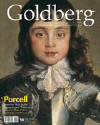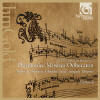Texte paru dans: / Appeared in:
*

Goldberg Magazine # 18
Goldberg a cessé de publier
avec le # 54
~~~~~~
Goldberg is no longer available.
# 54 was the last issue.
HMG 507291

0794881854622
Consultez toutes les évaluations recensées pour ce cd
~~~~ Reach all the evaluations located for this CD
• Petrucci’s Harmonice Musices Odhecaton, which appeared in 1501, was an epoch-making, and, at the same time, an epoch-summarizing publication. It was, and still is, a triumph of the printer’s art, innovative technically but decidedly backward-looking in terms of repertoire. So there is an autumnal harvest of songs, motets and dances, almost all from the Franco-Netherlandish tradition, almost all without texts. Perfect repertoire for Fretwork, naturally.
One of
Fretwork’s characteristics is their rhythmic precision and sense of what one
might describe as swing. Listen, for example, to the way Isaac’s La Morra
and Tartara, or Obrecht’s Tsat een mes Izin begin building up
almost immediately into punchy contrapuntal dances that sweep one
irresistibly along. A vital contributing factor here is the superb balance
between the instruments, in particular the clear presence of the bass
instruments, allowing the counterpoint to flow as it should. The third piece
in this little Isaac subset is the lovely, reflective J’ay pris amours,
which shows Fretwork positively tugging at the heartstrings. As well as
concluding the Isaac trio, it is paired with Obrecht’s far more substantial
setting of the same tune. This is the longest piece on the disc, and must be
counted one more major achievement by this still-neglected composer. Grouped
settings recur, fascinatingly, throughout the disc, so we have doubled
settings not only of J’ay pris amours, but also of Tandernaken
(Lapicida and Agricola) and Fortuna desperata (Pinarol and
anonymous), three of Fors seulement (Ghiselin, Agricola - or, more
probably Brumel - and Obrecht), and four of De tous biens playne (Hayne
van Ghizeghem, Van Stappen, Agricola and Josquin). A gem of a disc.
IVAN MOODY
Cliquez l'un ou l'autre
bouton pour découvrir bien d'autres critiques de CD
Click either button for many other reviews


